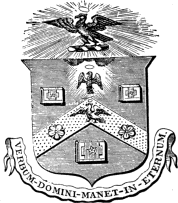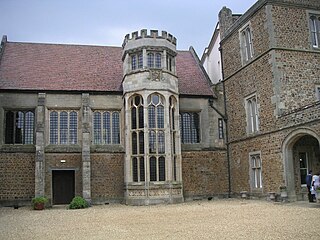
Sir Thomas Wyatt was a 16th-century English politician, ambassador, and lyric poet credited with introducing the sonnet to English literature. He was born at Allington Castle near Maidstone in Kent, though the family was originally from Yorkshire. His family adopted the Lancastrian side in the Wars of the Roses. His mother was Anne Skinner, and his father Henry, who had earlier been imprisoned and tortured by Richard III, had been a Privy Councillor of Henry VII and remained a trusted adviser when Henry VIII ascended the throne in 1509.
This article contains information about the literary events and publications of 1557.
Thomas Tusser was an English poet and farmer, best known for his instructional poem Five Hundred Points of Good Husbandry, an expanded version of his original title, A Hundreth Good Pointes of Husbandrie, first published in 1557. For Tusser the garden was the domain of the housewife, and the 1562 text expands on this theme. Scholars also consider it a text of interest for its defence of enclosures. It was among the best selling poetry books of the Elizabethan age.
Nicholas Grimald (1519–1562) was an English poet and dramatist.

The Worshipful Company of Stationers and Newspaper Makers, usually known as the Stationers' Company, is one of the livery companies of the City of London. The Stationers' Company was formed in 1403; it received a royal charter in 1557. It held a monopoly over the publishing industry and was officially responsible for setting and enforcing regulations until the enactment of the Statute of Anne, also known as the Copyright Act of 1710. Once the company received its charter, "the company's role was to regulate and discipline the industry, define proper conduct and maintain its own corporate privileges."

Wynkyn de Worde was a printer and publisher in London known for his work with William Caxton, and is recognised as the first to popularise the products of the printing press in England.
Songes and Sonettes, usually called Tottel's Miscellany, was the first printed anthology of English poetry. First published by Richard Tottel in 1557 in London, it ran to many editions in the sixteenth century.

John Day was an English Protestant printer. He specialised in printing and distributing Protestant literature and pamphlets, and produced many small-format religious books, such as ABCs, sermons, and translations of psalms. He found fame, however, as the publisher of John Foxe's Actes and Monuments, also known as the Book of Martyrs, the largest and most technologically accomplished book printed in sixteenth-century England.
Robert Crowley, was a stationer, poet, polemicist and Protestant clergyman among Marian exiles at Frankfurt. He seems to have been a Henrician Evangelical in favour of a more reformed Protestantism than the king and the Church of England sanctioned. Under Edward VI, he joined a London network of evangelical stationers to argue for reforms, sharing a vision of his contemporaries Hugh Latimer, Thomas Lever, Thomas Beccon and others of England as a reformed Christian commonwealth. He attacked as inhibiting reform what he saw as corruption and uncharitable self-interest among the clergy and wealthy. Meanwhile, Crowley took part in making the first printed editions of Piers Plowman, the first translation of the Gospels into Welsh, and the first complete metrical psalter in English, which was also the first to include harmonised music. Towards the end of Edward's reign and later, Crowley criticised the Edwardian Reformation as compromised and saw the dissolution of the monasteries as replacing one form of corruption by another. On his return to England after the reign of Mary I, Crowley revised his chronicle to represent the Edwardian Reformation as a failure, due to figures like Thomas Seymour, 1st Baron Seymour of Sudeley, Edward Seymour, 1st Duke of Somerset and John Dudley, 1st Duke of Northumberland. Crowley's account of the Marian martyrs represented them as a cost mostly paid by commoners. The work became a source for John Foxe's account of the period in his Actes and Monuments. Crowley held church positions in the early to mid-1560s and sought change from the pulpit and within the church hierarchy. Against the Elizabethan Religious Settlement, Crowley was a leader in the renewed vestments controversy, which eventually lost him his clerical posts. During the dispute he and other London clergy produced a "first Puritan manifesto". Late in life Crowley was restored to several church posts and appears to have charted a more moderate course in defending it from Roman Catholicism and from nonconformist factions that espoused a Presbyterian church polity.
William Seres was an English Protestant printer, starting work in about 1546, and working in partnership with John Day for a few years. Day and Seres specialized in religious works, such as those by Robert Crowley, which were largely related to theological controversies of the time. By 1550, Day and Seres were busy and successful enough to amicably separate their businesses.
John Cawood (1514–1572) was an English printer. He came of an old Yorkshire family of some substance and was apprenticed to John Reynes, who is best known as a bookbinder and who died in 1543 or 1544. In 1553 Cawood replaced Richard Grafton as Royal Printer. For his official salary of £6. 13s. 4d. per annum, Cawood was directed to print all "statute books, acts, proclamations, injunctions, and other volumes and things, under what name or title soever" in English, with the profit appertaining.

Richard Pynson was one of the first printers of English books. Born in Normandy, he moved to London, where he became one of the leading printers of the generation following William Caxton. His books were printed to a high standard of craftsmanship, and his Morton Missal (1500) is regarded as among the finest books printed in England in the period.
Thomas Creede was a printer of the Elizabethan and Jacobean eras, rated as "one of the best of his time." Based in London, he conducted his business under the sign of the Catherine Wheel in Thames Street from 1593 to 1600, and under the sign of the Eagle and Child in the Old Exchange from 1600 to 1617. Creede is best known for printing editions of works in English Renaissance drama, especially for ten editions of six Shakespearean plays and three works in the Shakespeare Apocrypha.
Richard Meighen was a London publisher of the Jacobean and Caroline eras. He is noted for his publications of plays of English Renaissance drama; he published the second Ben Jonson folio of 1640/41, and was a member of the syndicate that issued the Second Folio of Shakespeare's collected plays in 1632.
Nicholas Okes was an English printer in London of the Jacobean and Caroline eras, remembered for printing works of English Renaissance drama. He was responsible for early editions of works by many of the playwrights of the period, including William Shakespeare, Ben Jonson, John Webster, Thomas Middleton, Thomas Dekker, Thomas Heywood, James Shirley, and John Ford.
William Stansby (1572–1638) was a London printer and publisher of the Jacobean and Caroline eras, working under his own name from 1610. One of the most prolific printers of his time, Stansby is best remembered for publishing the landmark first folio collection of the works of Ben Jonson in 1616.

William Barley (1565?–1614) was an English bookseller and publisher. He completed an apprenticeship as a draper in 1587, but was soon working in the London book trade. As a freeman of the Drapers' Company, he was embroiled in a dispute between it and the Stationers' Company over the rights of drapers to function as publishers and booksellers. He found himself in legal tangles throughout his life.
Nationality words link to articles with information on the nation's poetry or literature.

Robert Waldegrave or Walgrave, the son of Richard Waldegrave of Blockley, Worcestershire, was a 16th-century printer and publisher in England and Scotland. From 1578 to 1588 he printed numerous, mainly religious works in London, and from 1590 to 1603, more than 100 books in Scotland. In 1603, following King James I of England's accession to the English throne, he returned to England, but died later the same year.
Hyder Edward Rollins was an American scholar and English professor. He was a prolific author of articles and books on Elizabethan poetry, broadside ballads, and Romantic poets. He was an internationally recognized scholar on John Keats, and he edited the authoritative two-volume edition of Keats' letters.







